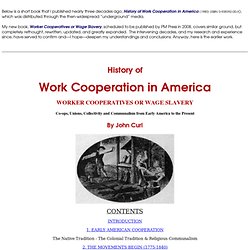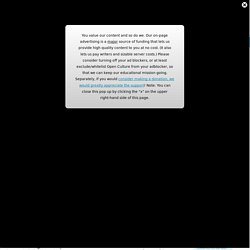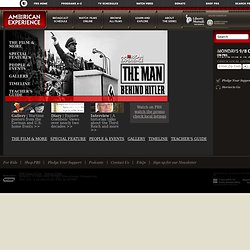

Cfa. Newspaper. Worker Cooperatives. Below is a short book that I published nearly three decades ago, History of Work Cooperation in America (1980) (ISBN 0-938392-00-X), which was distributed through the then-widespread “underground” media.

My new book, Worker Cooperatives or Wage Slavery, scheduled to be published by PM Press in 2008, covers similar ground, but completely rethought, rewritten, updated, and greatly expanded. The intervening decades, and my research and experience since, have served to confirm and—I hope—deepen my understandings and conclusions. Anyway, here is the earlier work. History of Work Cooperation in America Co-ops, Unions, Collectivity and Communalism from Early America to the Present The Native Tradition - The Colonial Tradition & Religious Communalism An Overview - Ideological Roots - Religious Communalism - Socialist Communalism - Workers' Parties - Early Stores - National Trades' Union Associationism - Union Cooperatives - Protective Union - Abolitionism 6.
History of the USA. Backup2. A Time Capsule of Training and Learning. The Convergence of Knowledge and Work. In looking at the challenges faced by today’s learning and development departments, it’s useful to look back through history at the different strategies that have been adopted to handle two similar, yet different, challenges: learning to handle information, knowledge and ideaslearning for the purpose of work In the past, there have been some areas of overlap between the two fields but until relatively recently, work has been mostly focused on the creation, buying and selling of goods and services whereas ‘knowledge work’ has been motivated by a desire to better understand the world around us.

The way that those ideas have eventually made their way into the world of work doesn’t take away from the fact that the original intention was generally of a less practical nature. [1] Given that more of the work carried out in developed countries is knowledge work, what lessons can be learned from history to help us support learning and development in the modern economy? History: Free Courses. Advertisement Get free History courses online from the world's leading universities.

You can download these audio & video courses straight to your computer or mp3 player. For more online courses, visit our complete collection, 1,250 Free Online Courses from Top Universities. Bookmark our collection of free online courses in History. For a full lineup of online courses, please visit our complete collection of Free Online Courses. Historical Thinking Matters: home page. American Experience. Gallery | Wartime posters from the German and U.S. home fronts >> Diary | Explore Goebbels' views over nearly two decades >> Interview | A historian talks about the Third Reich and more >> Watch on PBS watch the promo check local listings Mondays 9/8 C On PBS Pledge Your Support Stories to Go.

History News Network. Who cares about the American Revolution and why should something that happened more than 200 years ago matter today?

These are among the questions raised by a recent national survey, sponsored by The American Revolution Center, which revealed an alarming lack of knowledge of our nation's founding history, despite near universal agreement on the importance of this knowledge. The study, conducted in the summer of 2009 among a demographically representative random sample of U.S. adults, is the first national survey of adult knowledge of the American Revolution and its ongoing legacy. It reveals that Americans highly value, but vastly overrate, their knowledge of the Revolutionary period and its significance.
Asked to grade themselves on their knowledge, 89 percent of adults polled believed they could pass a basic test on the American Revolution. Forty years of the internet: how the world changed for ever. Towards the end of the summer of 1969 – a few weeks after the moon landings, a few days after Woodstock, and a month before the first broadcast of Monty Python's Flying Circus – a large grey metal box was delivered to the office of Leonard Kleinrock, a professor at the University of California in Los Angeles.

It was the same size and shape as a household refrigerator, and outwardly, at least, it had about as much charm. But Kleinrock was thrilled: a photograph from the time shows him standing beside it, in requisite late-60s brown tie and brown trousers, beaming like a proud father. Had he tried to explain his excitement to anyone but his closest colleagues, they probably wouldn't have understood.
It's impossible to say for certain when the internet began, mainly because nobody can agree on what, precisely, the internet is. (This is only partly a philosophical question: it is also a matter of egos, since several of the people who made key contributions are anxious to claim the credit.) 1939-1943.